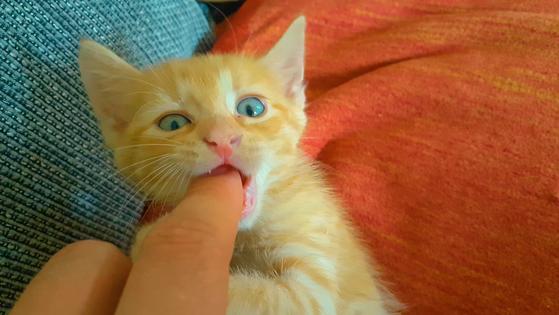My Pet World: When cat cuddles turn into surprise attacks
Dear Cathy,
Our four-year old Tabby cat, Yuma, is living his dream, sleeping cozily in our bed at night and hunting outside during the day. He can be quite cuddly in the morning before going outside. He likes to lay on my chest and rub his face on my face, often followed by gentle nibbles on my chin. However, this affection usually takes a frightening turn with him grabbing my jugular with his teeth. I grab him by the scruff, but he clamps down tighter. My only saving grace is using my finger to pull his jaw open. I don't believe I'm overstimulating him with excessive petting. Any idea what this behavior means?
— A'Lissa, New Bern, North Carolina
Dear A'Lissa,
When a cat does this, it can feel startling, but it often comes from play or hunting instincts rather than true aggression. Cats show affection in quirky ways, and sometimes the line between cuddling and playing gets blurred. Rubbing his face against yours and giving gentle nibbles are normal signs of bonding. The sudden neck bite, however, is not affection but him slipping into “predator mode.” Your cat may be treating your face and neck as if they are prey, especially since he’s getting ready to go outside for the day.
Begin by changing your snuggle sessions from mornings to evenings, when Yuma’s more tired and less likely to have pent-up energy. Keep him on your lap or at your side, rather than on your chest, so he’s not right in your face.
Next, never use your hands as toys. Always have a stuffed animal or toy at the ready, so when you see Yuma shift from cuddly to nibbly, you can gently redirect him with the toy before he latches on. If he does grab hold of you, avoid grabbing by the scruff of his neck as this only makes cats clamp down harder. Instead, use a toy to encourage him to release you.
Cats like Yuma don’t mean harm. They’re just mixing up their affection with natural hunting instincts. With redirection and changing the time you snuggle, he can enjoy his cuddle time with you without crossing the line into scary territory.
For his safety, I encourage you to keep him indoors. If that’s not possible, fit him with a collar and bell, so the nearby wildlife can be alerted to his presence.
Dear Cathy,
I live in Las Vegas. Is heatstroke the number one thing I need to be worried about when walking my dog in the heat?
— Tim, Las Vegas, Nevada
Dear Tim,
Yes, heatstroke is the number one concern for dogs in hot weather. The two key things to watch are temperature (including pavement) and access to cool fresh water.
First, avoid walking your dog outside when it’s dangerously hot (over 100 degrees). If the air temperature is high, the ground is even hotter. Pavement and sidewalks can reach 140 to 150°F on a typical Vegas afternoon – hot enough to burn your dog’s paws in seconds. Always test the ground with your hand. If you can’t keep it there for five seconds, it’s too hot for your dog. Plan walks early in the morning or later in the evening when it’s cooler and safer and walk on the grass instead of concrete or asphalt. Second, always provide your dog with access to fresh, cool water. Water left outside heats up and can make your dog sick.
Watch for signs of heat stress, like heavy panting, drooling, glazed eyes, or slowing down – and get your pet to the vet immediately if you see them happening. Remember, dogs are closer to the ground and feel the reflected heat more intensely than you do.
Dear Cathy,
I liked your response regarding the cat who developed breathing issues. One irritant that wasn't mentioned, however, was smoke. Years ago, our cat had asthma, and the vet said attacks could be triggered by exposure to litter, candles, sprays or cigarette smoke. From that day on, my partner stopped smoking in the house and the cat's condition improved. I know smoking indoors is not as common as it was back then, but I thought I would mention it. Thanks for all the good information in your column.
— Cathi, Auburndale, Queens, NY
Dear Cathi,
Thank you for this reminder. Smoke of any kind, whether from cigarettes, candles, fireplaces, or even cooking, can irritate a cat’s lungs and worsen breathing issues, especially in cats with asthma. I’m glad to hear your partner’s change made such a difference for your cat. Small adjustments like that can have a big impact on our pets’ health and comfort.
_____
_____
========
(Cathy M. Rosenthal is a longtime animal advocate, author, columnist and pet expert who has more than 25 years in the animal welfare field. Send your pet questions, stories and tips to cathy@petpundit.com. Please include your name, city, and state. You can follow her @cathymrosenthal.)
©2025 Tribune Content Agency, LLC.
(c) 2025 DISTRIBUTED BY TRIBUNE MEDIA SERVICES, INC.












Comments